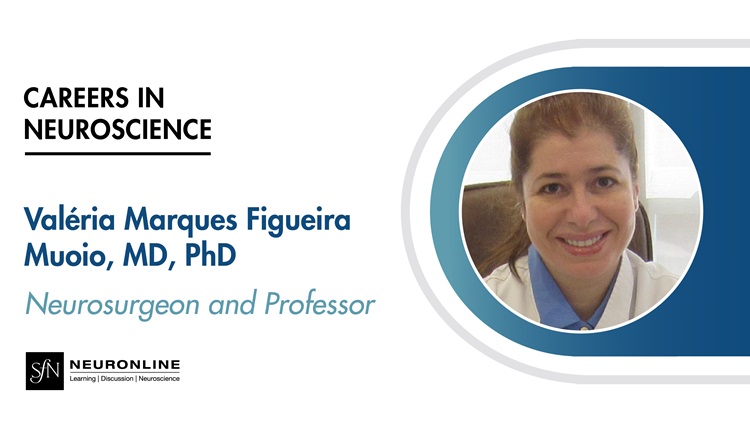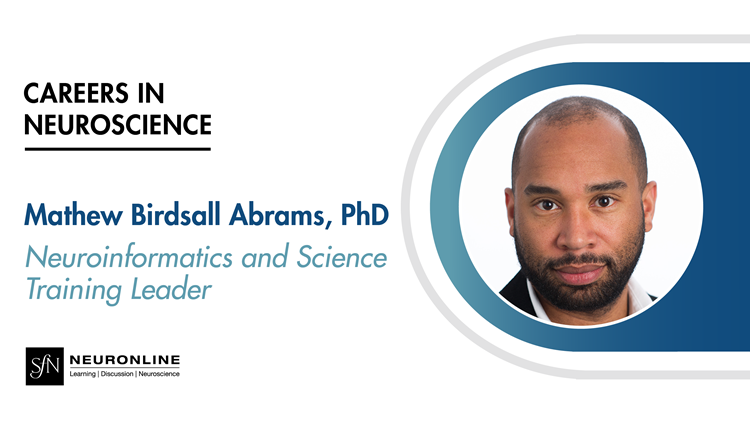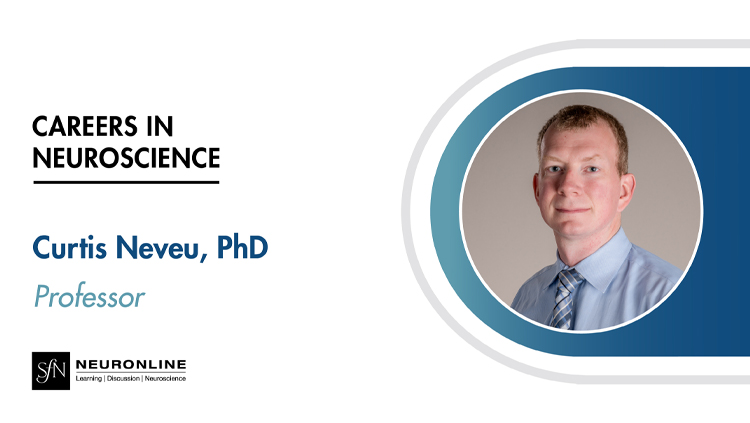Careers in Neuroscience: Science Policy Communicator
- Featured in:
- Careers in Neuroscience
Science policy and communication are more important than ever. In this next installment of Neuronline’s Careers in Neuroscience series, hear from Naomi Charalambakis, PhD, director of communications and science policy at Americans for Medical Progress. Learn about how she draws upon her neuroscience training to communicate effectively with nonscientific audiences and advocate for biomedical research and what qualities you may need for a similar career path.
What initially drew you to neuroscience? How did you discover your particular interest within the field?
I've always been fascinated by the brain—how neurological processes form, evolve, and sometimes break down, as they do in many diseases. That curiosity and drive to ask questions naturally led me to pursue neuroscience research, and during graduate school, I quickly saw how rapidly the funding landscape can shift and how deeply it affects research labs, the people behind the science, and the progress being made.
I began my PhD in 2013, just as sequestration took effect. In an effort to control the national deficit, Congress implemented sweeping, across-the-board budget cuts, and NIH’s funding dropped significantly. At a smaller university in a more rural state like Kentucky, the impact was profound. I had friends who weren’t sure they could continue working in their labs due to funding uncertainties. I couldn’t imagine a world where science wasn’t supported. I started to wonder: what if this happens again? That question opened the door to even more questions—ones that were focused on the role of scientists in shaping federal policy and the importance of advocacy. I was incredibly fortunate to have a mentor, my lab’s principal investigator (PI), who not only welcomed these questions but actively encouraged me to explore career paths beyond academia.
What resources, experiences, or conversations helped you clarify your direction?
First, everyone’s path is different, and that’s the beauty of it. Your career journey unfolds on your own timeline, guided by your unique goals and values. For me, as challenging as imposter syndrome could be, there were a few defining moments and conversations that helped shape my path. One of the most important was telling my mentor and PI, someone who had spent his entire career in academia, that I didn’t see myself staying on that track but still wanted to make a meaningful contribution to neuroscience. That conversation was my "aha moment.” It opened my eyes to new possibilities like science policy and advocacy, which I hadn’t even realized were viable career paths, and it also helped me grow as a scientist and thinker. I felt like I had finally found my purpose, along with a support system and level of accountability I didn’t know I was missing.
The second pivotal moment came from stepping outside my comfort zone. Despite being introverted, I pushed myself to put myself out there. When an internship in science policy with Research!America came along, I took the leap. I got a firsthand look at the day-to-day work in policy and evaluated whether it was the right fit. Those two moments were incredibly meaningful for me, but it’s not a formula. There’s no single “right” way to build a career outside of academia. Stay curious, connect with people, build your network, lean on your support system (including multiple mentors!), and above all, don’t give up.
Describe your current role. What are the most common skills you use on a weekly basis? Is your role "typical" to the industry?
As the director of communications and science policy for a nonprofit organization that advocates for biomedical research, I play a central role in shaping and executing our communication and policy strategies. Like many roles in this space, this position relies heavily on building and maintaining relationships with a diverse range of stakeholders—including our members, congressional staff, federal agency leadership, and the public. On a weekly (and often daily) basis, I draw on key skills such as translating complex, jargon-filled documents into clear language for broader audiences, critically analyzing federal policy developments, and effectively communicating with nonscientific audiences, including the media and general public.
How did you apply your academic training to a non-academic career? What skills translated well, and what did you have to learn?
My academic training in neuroscience taught me how to analyze complex information, think critically, and communicate ideas clearly—skills I now use daily in my role at Americans for Medical Progress. Whether I’m summarizing federal policy changes, crafting public-facing messages about the importance of animal research, or engaging with lawmakers and media, my scientific background helps me translate complex topics for diverse audiences. What I had to learn, however, was how to effectively shift my writing style from academic to concise, policy-focused briefs intended for a nonscience audience. I’ve also learned how essential it is to build relationships across sectors and stay adaptable in a fast-paced policy landscape. Academia gave me a strong foundation in critical thinking and attention to detail while keeping the bigger picture in mind. My job has been a great opportunity to apply that thinking toward real-world advocacy and shaping public policy.
How did you approach mentors for career advice? What strategies helped you build a professional network?
I selected mentors based on their research experience and their level of achievements. Building a professional network is an art form that requires trial and error and determination. Don't be afraid to go out on a limb and advocate for yourself, and don't be afraid to put yourself in potentially awkward positions by inserting yourself into conversations.
What strategies have helped you in job searching? Where did you look for roles? What platforms, organizations, or communities were most helpful?
I used Google and cold-call emails as well as attending conferences and approaching speakers after their presentations.
If you were a hiring manager, what experiences or skills would stand out to you on a resume for a role in your field?
For me, the key theme I’d look for across a candidate’s resume and cover letter is the ability to translate complex scientific concepts into clear, accessible language for diverse audiences. Strong writing skills are essential, ideally with experience drafting policy briefs, op-eds, or similar materials. I’d also value experience in stakeholder engagement—whether through advocacy, outreach, or coalition-building—because relationships are the lifeblood of policy and advocacy work. A standout candidate will also demonstrate initiative, such as organizing events, contributing to policy discussions, or participating in science communication efforts. Finally, adaptability is critical. This field often demands quick turnarounds, so the ability to process and clearly communicate evolving issues in real time is a highly valuable skill.
What advice would you give to students or early-career professionals interested in this path? Are there opportunities for people to find jobs in your industry with a variety of degrees (bachelor's, master's, PhD)?
My biggest advice is to start exploring early—through internships, volunteering, science communication, or campus advocacy efforts. There’s no single path into science policy or communications, and people enter the field with a range of degrees, from bachelor’s to PhDs. What matters most is your ability to communicate effectively, think critically, and stay curious about how science intersects with society. Take initiative, build your network, and don’t be afraid to reach out to professionals in roles you’re interested in—informational interviews can be incredibly valuable. Whether you’re passionate about policy development, public engagement, or media strategy, there’s room in this field for a wide range of skills and backgrounds.
Is there anything we didn't ask that you think should be included?
If you have any further questions or are seeking advice, please feel free to reach out to me via email (naomi@amprogress.org) or through LinkedIn.



.jpg?h=423&w=750&la=en&hash=5874576AB4EF551095D71B87EF35C5F1D909877E)







